
Once upon a time in 963, one guy exchanged some properties in Germany for a small rocky place in the heart of Europe: Lucilinburhuc, the little castle. 1044 years later, we’ve come a long way…
On the occasion of a purely conventional Groussh‰erzogsgebuertsdag, your arguably most unpatriotic Lux representative, her Silliness Nutshell-in-exile, would like to say a few words. The upside is that my speech will not be delivered in Luxembourgish with a French accent, but in English with a Luxembourgish accent.
What do I miss about Luxembourg? Of course, all those dear persons that I call my friends and family - but this is hardly the place to reminisce about such personal matters. My J’accuse does not exclude me, for I am not free of influence of the place I have grown up in.
I miss its hills, the lake, and EislÈk more generally, the Belgian border at Colpach, its farm houses, its chapels along the road, its cleanliness, its city walls and high cliffs, its castles and secret passages. It is a place full of different languages, reservation and Muttergottesstatuen. My dreams about it are filled with winding roads and cow stables. It is a beautiful place, like a village with too much money, blown up out of proportion. It has suffocating elements that provoke migraines and bursts of anger in me. It rests on a conservative mentality that screams ‘mir wÎlle bleiwe…’ and on citizens who accusingly point fingers ‘quo vadis…’ in stylistically awful / rhetorically inane, often content-free Briefe and die Redaktion. Luxembourgers abroad tend to complain about running taps, soft mattresses, and food that is inadequate for their bowels. They miss their daily dose of obituaries (the country is so small all of those can be put on a few pages of newspaper) and work out the cause of death from the wording of the announcement. Marriage and birth announcements are studied in detail, with extensive excursions of kinship and place ‘oh look, isn’t this the nephew of Muller from Siewebueren, on the mother’s side, you know the one who worked at the Schmeltz for a while and then had this car accident with Wampach from Wecker, he has a child with the Eller widow’s daughter’. Our territory was made smaller in the mid nineteenth century, but we were transformed from being a Duchy to being a Grand-Duchy. That was our consolation, and has left us with a Fuerz am Kapp. We are marked by being occupied twice in the wars of the twentieth century. We are not German, we say, grinding our teeth, just before adding that we are not nationalist. We really took the post-war welfare state seriously. Steel industry was ours before Mittal’s time. The country’s post-industrial state of wealth is reflected in its prettier-than-fairytale urban spaces: impressive museums with a lot of marble, paved plazas, renovated mansions, flowers planted in subtle arrangements of to-the-millimetre exactitude, sanitised, every microbe removed. The property prices in the city do not add to the liveliness of the place, as your average person cannot afford to live here, not even in the smallest of cupboards. The Pafendall is the place I would choose to live in, had I unlimited funds and patience (natiirlich och wÈinst dem Numm). Architectural wonders of centuries of occupation: Vauban, the Spanish, the Austro-Hungarians and Pei (more recently) have left traces. I walk down Grand’-rue with ever changing upper crest boutiques that add to the flavour of wealth. Identities made and remade in a frenzy through consumption goods and luxury articles: cars, jewelry, upmarket restaurants, cosmetics, culture. I walk on and count the banks. Geld stÈnkt nit, they say. I walk on past William the Second of the Netherlands, the only Dutch ruler who bothered to visit his Luxembourgish colony. Full of gratefulness we made him a statue. I can smell the earth of the flowers of the market, as they watered them in the morning breeze. I buy some vegetables. Markets for city people, once a week. I walk down past our national fox, Renert, who sits, head bowed (?), listening to the chimes of the cathedral. The beautiful empty cathedral of ours: Maryland how I love thee. Note to self: buy a black party card one of these days, just for the hell of it. The boulevard Roosevelt, rich of symbols, and entrance to one set of the underground casemates that smell like urine and mould. I nod in direction of the public service canteen (another convent converted) and walk past Disneyland meets Hellege Geescht (crimes of an urbanist nature are also committed in the Grand-Duchy…). In hiding a view of the Gronn that is one of my favourites and that shows the converted male and female prisons where detainees used to glue bags (a detail that fascinated me as a child…), and a convent that is beautifully renovated and now hosts cultural events. I return to the boulevard and cross that bridge (having come to it) that spans across lush green depths of park valley where the Alzette and the PÈtrusse flow. God built his church on a rock and called it Luxembourg. The quartier Gare has a more lively mix of architecture, but you need to look up. Here, too, the same boring shops that you find in any European city now have taken over. The Fischer-mafia has sucked up most of the bakeries (but in Biekerich remains, without exaggeration, the best baker in the world… I would give a lot for one of his frangipanes now, too bad I have high cholesterol…), but Journal cafÈ has remained. There is little interaction in the city, people live far from each other, but not in distance. Nothing touches me is the curse, reversed, that I carry with myself: everything touches me. Every now and then you run into someone who is the opposite. The smallness makes that people consider that half an hour’s drive is far away. Everything is small: the train station, the airport, the Autobunnopfaarten, my village. My village, Redange-les-Bains (well, we have a river originating in the Ardennes…) has, among other things less remarkable, a Kropemann, a Cactus, a water reservoir that looks like a Roman villa, and a swimming pool that has much changed since I was a kid. I want to go back to the time I enjoyed playing in the local Harmonie, and when I helped organise scouts for kids on the weekends. I longed to leave even then. When or if I return I will remember how privileged the place is I grew up in, and fight against attitudes of pettiness, envy, delusions of grandeur, and nagging that sometimes take it over. Maryland mon amour – Smallville ma peine – vive de Grand-duc, vive d’Grand-duchesse... Et kinnt een hei theoretesch nach Leit derbeiflÈcken mat deene LÎtzebuerg sech bretzt: vive de Victor Hugo, vive de SchanKloot, vive de Robert Schumann, vive de Generol Patton, vive de Superjhemp, etc. mee et ass e wÈinich pÈnibel… allez, vive LÎtzebuerg!

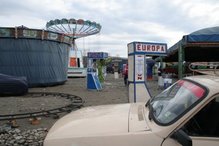
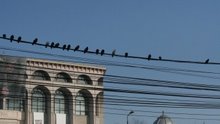
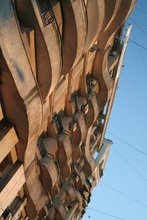
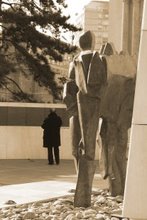
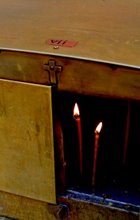
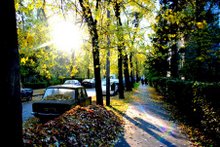

3 comments:
According to the "Dish installation assistance" wizard (with Romania as input parameter) on the web page of some "Européenne" company - but located in Lucilinburhuc of course - a 120cm satellite dish would have enabled you this morning to watch Mr Dillenburgs extensive discussions whether ladies should wear a hat during the Te Deum or not.. Afterwards, the usual fights in favour or against the Roude Léif and the Tricolore. You really missed something today down there in Romania...
And the award for the best ethnographic monograph that fits on two A4 pages and is published on a blog on Jangendag goes to... you! Wonderful. Rock on!
Oh jo, komescht Vollek waat mer sin! Ech war nach den 22. zu Letzebuerg, sin awer dun abgedampft. Ausser den Leit, haenken ech am meeschten um schinen Isleck... Hmm, et get Zait fir en WE zu Veinen, mengen ech!
E belschen Grouss fir d'Compatriotin an Rumänien (mir Letzebuerger sin jo esou ureuropaesch ;-)
Post a Comment